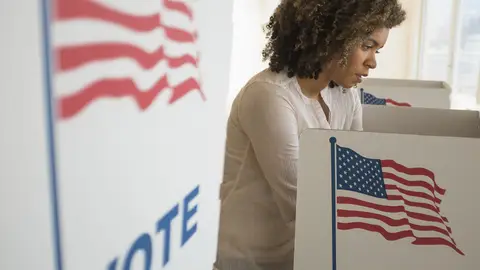Report: Queer Women Are 13% Less Likely to Vote in 2020 Than Queer Men

If 2020 candidates want to increase LGBTQ voter turnout, they may try talking with queer women. According to a new study released by LGBTQ women’s super PAC LPAC, just 72% of queer women report they are “almost certain” to vote in November’s 2020 elections, compared to 85% of queer men surveyed.
Those numbers could provide a roadmap to Democratic contenders looking to turn swing states blue next year. The Williams Institute at UCLA reported last month that more than one in five LGBTQ people (21%) wasn’t registered to vote. Queer voters make up nine million people and new registrations could push Democratic presidential candidates to victory, a NewNowNext analysis found.
LPAC’s research drills further into those findings, suggesting that while queer women are donating time and money to advancing LGBTQ equality far more than their straight peers, that activism is less likely to translate into politics.
“For the first time, we understand how to excite people across our community about political engagement as a result of this trailblazing work,” Stephanie Sandberg, executive director of Project LPAC, said in a statement.
Overall, 36% of LGBTQ-identified women said they had donated time or money to an LGBTQ rights group compared to just 9% of the general population. They were overwhelmingly driven to the polls by issues that impacted queer people: Fifty-four percent said that Trump’s transgender military ban pushed them to vote (compared to 41% among queer men), while 66% said that employment discrimination had them casting ballots (compared to 59% of queer men). That gap widens even further when it comes to housing discrimination—60% of queer women vote on that issue compared to 47% of men.
The study found that transgender voters in particular want to do more to become politically engaged; 46% said they would do more to get involved if candidates spoke to their issues, while 22% LGBTQ women said the same. That’s compared to just 6% of the general population.
Among queer women of color, the research reflected some desire to see more candidates who reflect them. Twenty percent surveyed said they wanted to see more candidates who shared their background or identity.
The new research breaks down data from 1,501 voting age adults, 645 of whom identity as LGBTQ.





